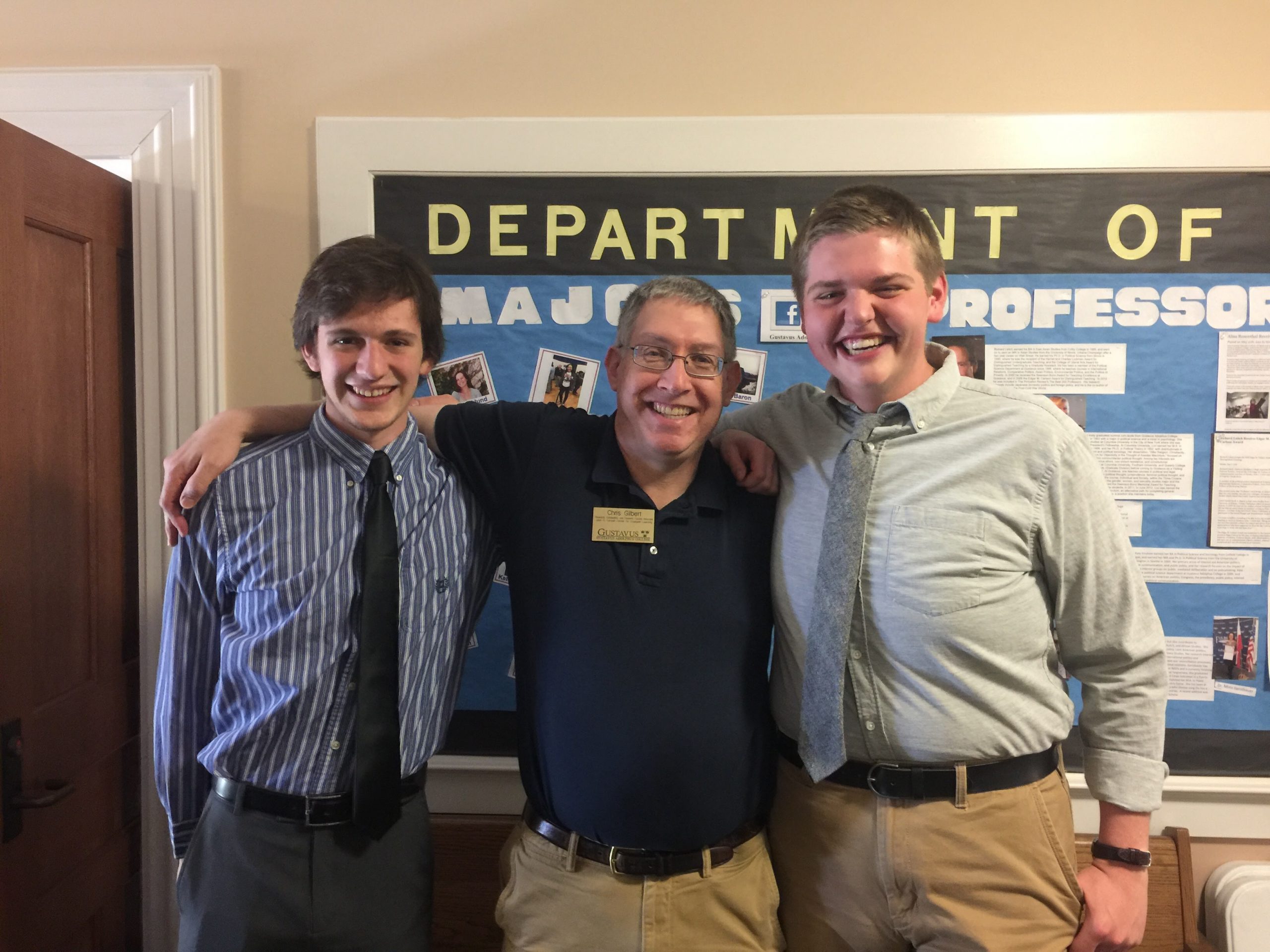“When a professor asks you to accompany them for lunch at the Gustavus Lunch Buffet, you should probably say yes.”
That is exactly what Gustavus Adolphus College seniors Joe Cella and Alex Jensen did last year when political science professor Chris Gilbert invited them to join him following the end of fall semester. Now, they join Gilbert as published authors.
After months of research and writing, Gilbert, with co-authors Cella and Jensen, have published a book chapter, “The Resurgence of Evangelical Political Strength in 2016 Minnesota Electoral Politics” in the soon-to-be-released book, God at the Grassroots 2016: The Christian Right in American Politics. Published by Rowman & Littlefield, the book is edited by Mark J. Rozell of George Mason University and Clyde Wilcox of Georgetown University.
For political science majors Cella and Jensen, this is the first experience researching in a professional setting. For Gilbert, it is another milestone in both a successful career focused on religion and American politics and also in a long history of student collaboration on research projects.

In 1994, Gilbert joined a team of political scientists organized by Rozell and Wilcox to study and write about the influence of Evangelical politics across several states. The book series, God at the Grassroots, features Gilbert’s Minnesota-focused contributions across multiple editions in 1994, 1996, 1998, 2000, and 2004. The series was revived to capture the influence of Evangelical politics following the 2016 presidential election. Gilbert was again invited to contribute the Minnesota chapter.
“The opportunity to revisit this work was very exciting and being able to work with Joe and Alex on this chapter was extremely rewarding because it continues the tradition of student authors joining the work for this series,” said Gilbert.
After seeing new research following the election last fall, Gilbert immediately thought of two students who were completing his 300-level political science course focused on empirical analysis, just the type of work that would be necessary for the chapter. Designed to allow students interested in statistical and empirical work a deeper grounding in quantitative methods used in political science, Gilbert’s Empirical Political Analysis course tasks students with pursuing their own research project. Cella and Jensen, close friends after three years at Gustavus and repeat students in Gilbert’s classes, immediately enrolled and partnered for the independent project.
“We wanted to expand the previous research on college students as a part of electorate beyond ‘Get out the Vote’ efforts. Chris always preaches to utilize statistical findings as the means of analyzing impacts and making robust conclusions, so this is what we tried to do,” Jensen said.
Titled “It’s a Party on Campus,” their final project was a comprehensive study of the Minnesota electorate and analyzed the impact of college students on State House and Senate elections. The paper won the department’s annual writing award the following spring at the Political Science Honors Day Symposium.
“Alex and Joe had an extremely innovative project. They had to organize their own data and were able to show that really subtle differences existed and mattered… it showed initiative, creativity, and organization,” Gilbert said. “It was really above and beyond expectations and adding in their developed literacy in Minnesota data, it made a lot of sense to work with them.”
Tasked with determining the impact of the Evangelical politics on the presidential election in 2016, Gilbert, Cella, and Jensen spent the winter and spring gathering relevant background research, compiling data sets from Minnesota counties, and analyzing the implications of the findings.

“We sat back to back at our computers,” recalled Jensen. “I shouted numbers from the county data and Joe entered them into SPSS to create our data sets. And then we repeated it. A lot. Then, we could bring it to Chris and assess what the data was saying.”
“Watching the way Chris worked was rewarding in itself and being a part of his support team in finding statistical conclusions was very cool. We had clear expectations yet were given independence and weight in the direction, it was a very beneficial experience,” Cella said.
Now, their long hours and meetings with Gilbert are in print.
“This is what I want to do. I really like research. And the chance to do it with my best friend, a great professor, and get published as an undergrad was incredible,” Jensen said.
“Published in a book? Pretty weird,” Cella said. “But it reaffirms that this world needs more and more people who are willing to sit down with evidence and try to tackle the issues at hand, and in the future I’d love to do so in a way that can best impact people disadvantaged by the system.”
Jensen and Cella are both currently completing their senior theses in political science, preparing to graduate this spring with minors in history and mathematics, respectively. Neither are strangers to Gilbert’s office. Jensen, in pursuit of a doctorate and a career as a professor in political science, focused in American government and parties and elections, has spent many hours listening to advice from Gilbert and will join him as teaching assistant next spring.
“He’s going to make a really neat prof,” Gilbert said.
“But Alex, what are you going to do when a first-year asks you a stats question that you don’t know?” Cella asked.
Jensen smiled, “I’ll just tell them to call you, the smarter one.”
For more information about the Department of Political Science, visit the Gustavus website.

Leave a Reply
You must be logged in to post a comment.